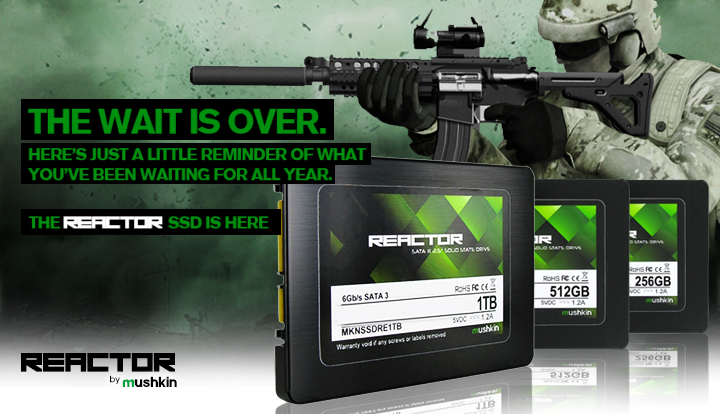Mushkin Reactor 256GB SSD Review
Mushkin's Reactor SSDs sell for very low prices online, and the 1TB model is one of our top value picks. Is the 256GB model as good of a value? We answer that today.
Why you can trust Tom's Hardware
Conclusion
After looking at the test results, you may discard the Reactor and consider it a poor product. The 256GB model doesn't have the same value as the two larger-capacity models, failing to offer mainstream performance at an entry-level price. But we do see some potential here.
The low queue depth random performance hurts the Reactor 256GB's value as an operating system drive, but the high sequential performance, especially compared to most TLC-based drives, gives this model life as secondary storage to install games on. Mushkin billed the Reactor as a model designed for gamers, and that user group will benefit the most from MLC over TLC with SLC cache. When you install games that are now up to 50+ GB in size, you want the high sustained-sequential-write speed and not a tiny buffer that quickly falls to less than HDD levels.
Further saving the Reactor is the fact that most new low-cost SSDs will ship with TLC. The longer Mushkin keeps this model around, the better it will look for the target audience. Micron and Toshiba are not planning to build quad-plane TLC flash, so anything using TLC from either company will find lower than HDD sequential-write performance. Samsung, on the other hand, has a real gem with the 850 EVO. It's the drive all others must undercut on price in order to compete today.
As it sits right now, both the Reactor 256GB and the 850 EVO 250GB sit right at $90. That's a bad place for the Reactor 256GB and again shows how Samsung is turning the screws on other SSD manufacturers. For the Reactor 256GB to compete with entry-level drives, like Mushkin does with the larger-capacity versions, the price needs to first get into entry-level territory.
MORE: Best SSDs For The Money
MORE: Latest Storage News
MORE: Storage in the Forums
Chris Ramseyer is a Contributing Editor for Tom's Hardware, covering Storage. Follow him on Twitter and on Facebook.
Follow Tom's Hardware on Twitter, Facebook and Google+.
Get Tom's Hardware's best news and in-depth reviews, straight to your inbox.

Chris Ramseyer was a senior contributing editor for Tom's Hardware. He tested and reviewed consumer storage.
-
mapesdhs It's a pity you weren't able to obtain a Trion 150 for this review, as that would be the more logical OCZ comparison once stock becomes available.Reply
Also, isn't it time we just concluded that the PCMark8 "Real World Software" tests are a complete waste of time? They show no statistically relevant variation at all, even though in many cases it's easy to see significant differences between, say, an 850 EVO and a Trion 100.
-
CRamseyer Hello,Reply
My Trion 150 drives just arrived. You can read a bit about them here:
http://www.tomshardware.com/news/ocz-trion-150-firmware-tweaked,31126.html
The Real World Software Tests show valuable data for those who are not well versed in SSDs. I think people need to understand that we are talking about differences in performance measured in seconds and not minutes. -
knowom http://www.newegg.com/Product/Product.aspx?Item=N82E16820211984Reply
Best value SSD atm if you ask me. If you want more storage grab a second which you can use in raid or to use as another partition with it's own bandwidth. Iither way huge price to performance value.
